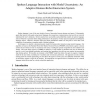354 search results - page 64 / 71 » Learning Character Behaviors Using Agent Modeling in Games |
117
Voted
ATAL
2006
Springer
15 years 3 months ago
2006
Springer
We study how decentralized agents can develop a shared vocabulary without global coordination. Answering this question can help us understand the emergence of many communication s...
75
Voted
FLAIRS
2004
15 years 1 months ago
2004
TURING Test technologies are promising ways to validate AI systems which may have no alternative way to indicate validity. Human experts (validators) are often too expensive to in...
ICRA
2005
IEEE
15 years 5 months ago
2005
IEEE
— Imitation is a powerful mechanism for transferring knowledge from an instructor to a na¨ıve observer, one that is deeply contingent on a state of shared attention between the...
96
Voted
NECO
2007
14 years 11 months ago
2007
Learning agents, whether natural or artificial, must update their internal parameters in order to improve their behavior over time. In reinforcement learning, this plasticity is ...
CONNECTION
2008
14 years 11 months ago
2008
Spoken language is one of the most intuitive forms of interaction between humans and agents. Unfortunately, agents that interact with people using natural language often experienc...

